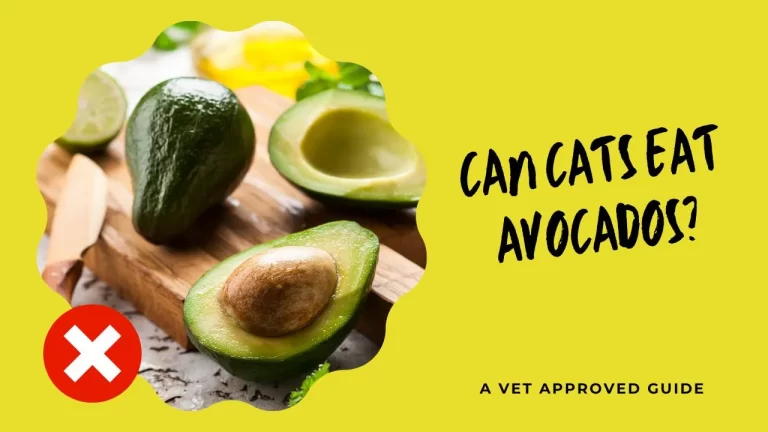No, cats should not eat avocados. Avocados contain a toxin called persin that can harm cats, dogs, horses, and birds. Persin can cause vomiting, diarrhea, obstruction of stool, and pancreatitis in cats. The skin, leaves, and pit of the avocado are especially dangerous and can pose a choking hazard.
Avocados provide protein, good fats, and antioxidants, but cats have distinct digestive systems and nutritional demands. Avoid avocados and stick to cat-friendly meals.
Key Takeaway:
- Cats should not eat avocados due to the presence of persin, a toxin that can cause vomiting, diarrhea, and other digestive issues in cats.
- Cat owners should be aware of the high-fat content in avocados, which can lead to obesity and other health problems in cats.
- If a cat accidentally eats an avocado, take them to a veterinarian as soon as possible to monitor for any symptoms and prevent potential health issues.
Risks of Feeding Avocados to Cats
Avocados contain a toxin called persin. Persin is found in the skin, leaves, pit, and bark of the avocado plant. It can cause vomiting, diarrhea, obstruction of stool, and pancreatitis in cats and dogs. Persin is especially harmful to horses and birds, as it can cause heart failure or sudden death.
The pit of the avocado also poses a choking hazard for cats, as it is large and hard. If swallowed, it can cause an intestinal blockage that requires surgery to remove.
What are the symptoms of avocado toxicity in cats?
If your cat eats any part of the avocado plant other than the flesh, they may show signs of avocado toxicity. These include:
- Vomiting
- Diarrhea
- Abdominal pain
- Loss of appetite
- Lethargy
- Difficulty breathing
- Swelling of the mouth or throat
What should I do if my cat eats an avocado?
If you suspect your cat consumed an avocado or any part of the plant, promptly contact your veterinarian. They might suggest inducing vomiting or administering activated charcoal to prevent toxin absorption. Additionally, they may conduct blood tests, x-rays, or ultrasounds to assess potential harm to your cat’s organs or intestines.
Treatment for your cat could involve hospitalization, intravenous fluids, anti-inflammatory medication, or surgical intervention, depending on symptom severity.
What is the best way to prevent my cat from eating avocados?
To prevent your cat from eating avocados, keep the fruit and plant out of their reach. Avoid leaving avocados on surfaces accessible to your cat, like countertops or tables.
Refrain from feeding your cat any human foods that contain avocados, such as guacamole or salads. Additionally, avoid growing avocado plants in areas accessible to your cat, whether it’s your home or garden.
If you wish to let your cat taste avocado flesh, ensure it is ripe, peeled, and pitted. Cut it into small pieces and offer it as an occasional treat. Limit the portion to a teaspoon per day, as avocados are rich in fat and calories, potentially leading to weight gain or pancreatitis in cats.
FAQs
Why are avocados toxic to cats according to ASPCA?
Avocados are hazardous to cats due to persin, which causes vomiting and diarrhea. Avocado leaves, fruit, seeds, and bark contain persin. Birds, horses, and rats are especially vulnerable to persin poisoning and may experience respiratory distress, heart failure, edema, and death.
Can cats eat small pieces of avocado flesh?
Cats may safely consume very little amounts of avocado flesh on occasion, but they should never eat the pit or peels, which pose serious choking risks and contain far more of the toxic persin. Cats may benefit from eating avocados since the flesh contains amino acids, good fats, and vitamins. Cats may become sick from eating too much avocado, so it’s best to limit their exposure to the fruit. It’s important to check with your vet before feeding your cat any avocado since some of them may be sensitive to the peel.
Is avocado oil safe for cats?
Due to its lack of persin and nutritional similarity to avocado flesh, avocado oil is typically safe for cats in moderate doses. It is important to limit or avoid giving avocado oil to cats on a regular basis because of its high caloric and fatty content. Excessive use of avocado oil has been linked to obesity, pancreatitis, and other conditions in felines.
What are the symptoms of avocado toxicity in cats according to ASPCA?
Toxic avocados cause mostly gastrointestinal signs in felines, including vomiting and diarrhea. These signs and symptoms may start appearing a few hours after intake and last around for a few days. Breathing problems, fluid buildup in the chest or belly, irregular heart rhythm, and shock are all possible outcomes when a cat consumes an excessive quantity of avocado or swallows the peels or pit. These signs are very dangerous and need urgent veterinarian care.
Are avocado pits a choking hazard for cats?
Yes, avocado pits are a choking hazard for cats, as they are large, hard, and slippery. If a cat swallows an avocado pit, it can get stuck in their throat or digestive tract and cause obstruction, perforation, or infection. Breathing, drooling, gagging, vomiting, stomach discomfort, and fever might ensue. To remove the avocado pit and heal injuries, a cat requires emergency surgery.







